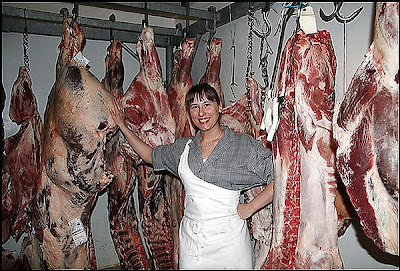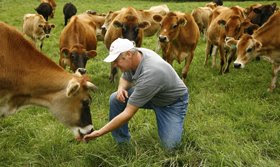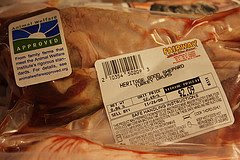The Final Draft:

The rough draft:
The PR department prepared a statement for me to read? Let's see it. "The Tyson Mission Statement on animal well-being" ... wait, this is a joke, isn't it? A mission statement on animal well-being? Was it Charlie who put you guys up to this? Good one, Charlie! You got me. Back to work, everybody. What? It's for real, you say? People care about how we treat the chickens? Undercover videos of abuse? You mean that video you showed me depicted animal abuse? I thought the folks from corporate communications made that to inspire the troops. Okay, fine. The Tyson mission statement on animal well-being. At Tyson foods, it's our mission to kill as many of the buggers as we can as fast as we can and we care about their well-being about as much as I care about this cockroach under my shoe. What? That's not what the statement you handed me said? I'll have to put on my glasses. Okay. Here's we go. Tyson Foods is committed to the well-being ... hee hee, I'm sorry, I can't read that with a straight face. Give me a minute. Okay, I'm ready. Tyson Foods is committed to the well-being, proper handling and humane slaughter ... now that part sounds more like it. Take out the "humane" in front of "slaughter" and you've got yourself a mission statement. Okay, fine, "humane" stays in. I pay you PR folks good money so I'll listen to you this time. Where was I? We're committed to the proper handling. You wrap your hands around the neck and twist. Heh heh. We pledge our diligence in leading the industry pursuit of new and improved methods of denying allegations of animal cruelty. I'm getting the hang of it, aren't I? I'm a natural. I don't need you suck-ups from corporate communications to hold my hand through this thing. What's this next part? "Stewards of the animals we work with every day?" Are you serious? I say something like that, I'll be the laughing stock of the entire poultry business. Okay, now I know it's a gag. You got me and you got me good. I know it was Charlie who put you up to this. The stewards of animals we work with every day. That's a classic. Good job, people. I like my employees to have a sense of humor. What comes next? "This is not only the right thing to do, but it is an important moral and ethical obligation." Hee hee! You guys are too funny. I practically peed my pants when I read that one. You tell Charlie I owe him one. Funny stuff, funny stuff!

















